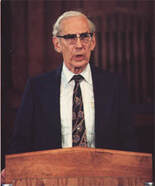|
By Dr. Roger Erdvig
WCS is adding a new Dean of Students position to our Administration Team. When people hear this news, they often think first of someone who will handle all the discipline in the school – keeping everyone in order. While he or she will be responsible for the discipline process, our view of discipline is much more holistic than that and has goals that go far beyond mere behavior management. At WCS, we view school discipline in a Biblical “shepherding,” or discipleship, motif. As such, we are concerned not only with external behavior, but also with how that behavior reflects the heart condition of our students. Scripture often describes the heart as the control center of one’s life. Therefore, behavior does not randomly spring out of a person; it is always a reflection of a deeper, unseen reality – a person’s heart. Of course, one’s environment does exert tremendous shaping pressure on a person, but ultimately, an individual determines his or her own actions. And one’s actions are determined by the heart. Thanksgiving as a holiday may be gone, but thanksgiving as a practice is not. At least from a Biblical perspective, it isn’t.
When considering Biblical thankfulness, you can’t separate it from another key Biblical concept – grace. The New Testament Greek word for “thanks” literally means “good grace,” so anytime you read the word “thanks,” you can substitute the phrase “recognize God’s good grace.” In saying thanks, we’re acknowledging that all we have comes from God’s generous stores of grace. This connection between thanks and grace is deeply embedded in our language and idioms. Did you ever wonder why we “say grace” before a meal? Did you ever wonder about the root of the word “gratitude?” (It is grace.) Or, in Spanish why the word for “thanks” is “gracias,” and in Italian, it is “grazie?” By Dr. Roger Erdvig, WCS Headmaster  To grow sturdy, deep-rooted plants, plant them close to the equator. Equatorial tropical zones are fertile and well-watered, and they benefit from year-round warmth—such locations are perfect for growing healthy plants. Even though I love northern Maine for its beauty and its offerings of countless outdoor adventures, it doesn’t compare to a tropical zone for growing plants. One look at the plant hardiness map for Maine tells the novice planter that it’s not the ideal place for gardening. This has become a helpful metaphor for me as I think about our most precious “plantings”—our kids. The environment in which we raise them is critical to their growth and development.  By Dr. Roger Erdvig, WCS Headmaster 2021 marks the 75th anniversary of WCS. Founded in 1946 by a group of six area church leaders and theologians, WCS was part of a plan to address "the great need in our area for a Christian education that would touch every area of life." Our founders had a firm conviction that it was impossible for a secular school experience to provide such an education. The first president of the first school board at WCS was Dr. R. Laird Harris. Dr. Harris was no lightweight educational dreamer or cultural naysayer. He was a well-respected theologian, prolific author, and the chairman of the committee that translated the New International Version Bible, one of the most popular translations of Scripture for decades. Many of my generation grew up with the NIV as our Bible of choice. By WCS Headmaster, Dr. Roger Erdvig
It’s June--the time of year when high school seniors leave childhood behind as they prepare to attend college or start working. It is also the time when juniors seriously begin thinking about what they will be doing in a year. What college should I attend? Should I take a year off or do a gap-year program? Maybe I should head straight to work? I am frequently asked by parents about my thoughts on Christian colleges, and I readily tell them why I believe Christian students should go to a Christian college. The concern behind their question is often for their child’s faith. But being in an environment that promotes a robust faith in Christ is not the ONLY reason I am a strong advocate for attending an authentic Christian university. Let's explore the challenges to Christian faith first.  By WCS Headmaster Dr. Roger Erdvig Parents have the hard job of deciding what kind of school is best for their children. Of the many options available, which will have a more positive impact on their child’s life long into the future? All parents want their children to become well educated, responsible, and productive adults. Part of this vision for the future is the hope that they will have a healthy marriage and family of their own. So how does parents’ choice of school relate to this important goal for the future?  By WCS Headmaster Dr. Roger Erdvig We hear a lot about biblical worldview as it relates to a Christian school education. But what exactly is a biblical worldview and how can a school help to shape that kind of worldview in students? Our approach to perceiving, interpreting, and living in the world around us includes our desires, our behaviors, and the propositions we hold to be true. Ideally, all three of these (also described as inclinations, actions, and truth claims) are consistent and cohesive. They make up our worldview and combine to form a pattern of ideas, beliefs, convictions, and habits. We use these to make sense of God, the world, and our relationship to God and the world. So a person with a biblical worldview is one who thinks, desires, and acts in ways that are consistent with God’s thoughts, desires, and actions as revealed through Scripture. Though truth claims are not the sum total of a person’s worldview, they do form its foundation. And for a well-formed biblical worldview, these truth claims are not random, unrelated ideas. Together, they make up an integrated narrative framework that accurately describes the way things are. A narrative framework is essentially a story of the world that provides a context for understanding why things happen the way they do and how we should respond to what happens. The narrative framework for a biblical worldview can be summarized in four key words. They are chronological in nature and provide meaning for all our experiences: Creation, Fall, Redemption, and Restoration.  By WCS Headmaster Dr. Roger Erdvig Practically overnight, everything changed. On Thursday, March 12, the WCS leadership team made the hard decision to postpone our Spring Gala (scheduled for the next evening) due to Governor Carney's declaration of a State of Emergency, which included guidance to avoid crowds of 100 or more people. Within 24 hours, we made the announcement to parents that due to COVID-19, we would need to pivot to all distance-based teaching and learning. A lot can happen in 24 hours! Teachers jumped on an aggressive learning curve to transition to video-based instruction, with only two weeks to do so. Students were suddenly home with all their school supplies and their families, and away from the their friends. WCS leadership meetings moved to video, and sports seasons came to a screeching halt.  By WCS Headmaster Dr. Roger Erdvig Spiritual formation and worldview development are two concepts that are really important for Christian schools. Indeed, it would be difficult to find a Christian school that is not concerned with both spiritual formation and worldview development, with one or both concepts mentioned in their mission or vision statements. (And if you DID happen to find a Christian school that didn’t keep these two concepts at the forefront of everything they do, you’d have to question whether it is a Christian school at all!) It is important to understand that all schools play a role in the process of spiritual formation and worldview development of their students. These are not exclusive domains of Christian schools. Public, private, parochial, homeschools--they ALL shape the spirit and the worldview of their students. That’s right, even non-Christian schools shape the spirits and the worldviews of their students. However, Christian schools ought to lead in intentional, specific spiritual formation and worldview development. By intentional, I mean that we must be able to point to observable activities that actually facilitate proper spiritual formation and worldview development in our students. We can’t just say that these are priorities; we must show that they are. And by specific, I’m saying that we are committed to Christian spiritual formation and Biblical worldview development.  By WCS Headmaster Dr. Roger Erdvig One of the aims that WCS has for our students and graduates is that they will be faithful disciples of Jesus Christ. This is a core element of why we exist as a school. However, shaping the heart of a young disciple is becoming harder and harder. From the intense pressure to conform to the spirit of the age, to the pervasive impact of the digital universe, we are in an uphill battle. Recent research suggests that the number of young adults in the U.S. who identify as followers of Christ is rapidly shrinking year after year. 64% of young adults who grew up in church have dropped out of (and sometimes back into) church. The number of teens who identify as atheists has doubled in the last year. And this impacts their core beliefs. Consider this—most teens in the US believe that not recycling is more evil than viewing pornography. Only 10% of young adults who consider themselves Christian actually have a robust, life-shaping faith in Christ. Have I convinced you yet of the uphill battle that WCS, our families, and our churches are facing? (Read about these stats and more at https://www.barna.com/category/millennials-generations/) But, there is good news. Researchers David Kinnaman and Mark Matlock have extensively studied today’s Christian landscape, and they have discovered ways that we can cultivate robust faith in our students and young adults. They’ve written about what they’ve learned in a new book, Faith for Exiles: 5 Ways for a New Generation to Follow Jesus in Digital Babylon. By WCS Headmaster Dr. Roger Erdvig
Most Christian schools include some version of "impacting the culture for Christ" in their mission statements. But very few define what that means, and even fewer seem to specifically plan for how they will actually equip their students to do so. WCS has adopted a set of four key questions that help guide our efforts at helping our students apply a Biblical worldview-- questions that flesh out what it means to impact the culture. These questions are adapted from Restoring All Things: God's Audacious Plan to Change the World Through Everyday People, by John Stonestreet and Warren Cole Smith. (Buy it here on Amazon.) 1) What is good in our community that we can cultivate? In this question, we're looking for what's already good in our community and considering how we can improve it. Whether it's perfecting a piece of music for a concert or re-writing several drafts of a persuasive paper to make it "pop," students are encouraged to take what's good, and make it better. |
Cultivating godly influencersWilmington Christian School provides a distinctively Christian, innovative education that effectively develops Godly influencers who are well prepared for life after high school and who impact the culture for Christ. Archives
May 2024
Categories
All
|
|
Wilmington Christian School provides a distinctively Christian, innovative education that effectively develops Godly influencers who are well prepared for life after high school and who impact the culture for Christ.
Wilmington Christian School admits students of any race, color, national and ethnic origin to all the rights, privileges, programs, and activities generally accorded or made available to students at the school. It does not discriminate on the basis of race, color, national and ethnic origin in administration of its educational policies, admissions policies, scholarship and loan programs, and athletic and other school-administered programs. |
|
|
© Copyright Wilmington Christian School. All Rights Reserved.
Website designed by PROSPER Creative Design
Website designed by PROSPER Creative Design


